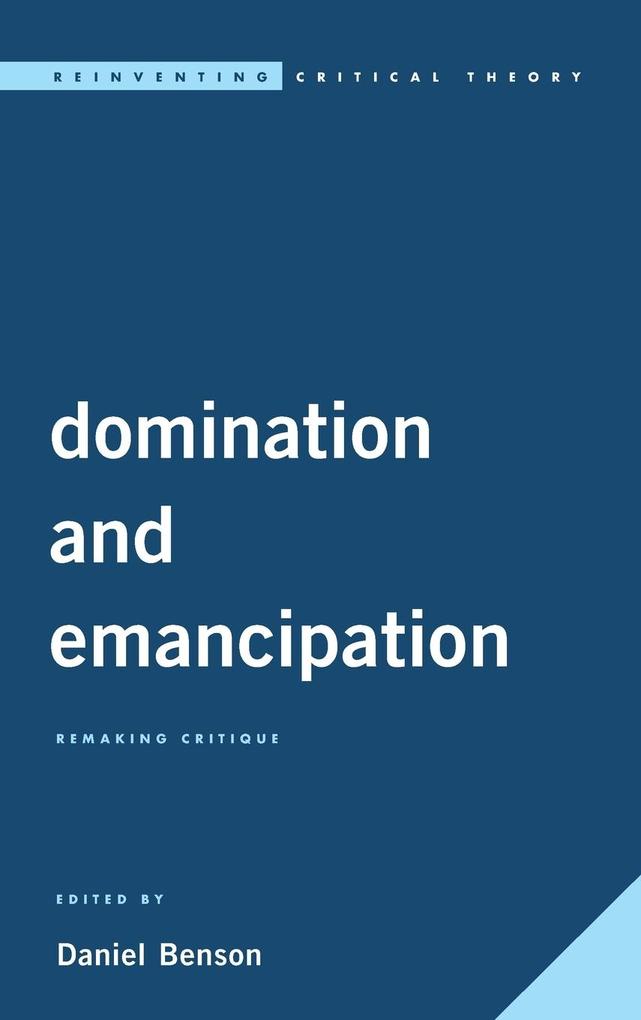
Zustellung: Do, 12.06. - Mo, 16.06.
Versand in 1-2 Wochen
VersandkostenfreiBestellen & in Filiale abholen:
A melancholy defeatism has become a hallmark of critical thought and leftist politics. A consequence of this has been an exaggerated focus on domination among critical theorists, leaving emancipation-along with questions of political organization and strategy-undertheorized at best, or disregarded as delusional, at worst. If emancipation still plays a role in critical reflection, it is most often in a "domesticated" form, made into a bedfellow of centrist liberalism.
Recent events necessitate a different outlook, especially since the financial collapse of 2008 and the myriad movements-emancipatory as much as reactionary-it has spawned throughout the world. Through a series of dialogues and reflections by leading thinkers, scholars, and activists, Domination and Emancipation: Remaking Critique seeks to rebuild the emancipatory pole of critique and bring forward theoretical work that is in step with the struggles and aspirations of the moment.
Recent events necessitate a different outlook, especially since the financial collapse of 2008 and the myriad movements-emancipatory as much as reactionary-it has spawned throughout the world. Through a series of dialogues and reflections by leading thinkers, scholars, and activists, Domination and Emancipation: Remaking Critique seeks to rebuild the emancipatory pole of critique and bring forward theoretical work that is in step with the struggles and aspirations of the moment.
Inhaltsverzeichnis
Note on Translations
Introduction
Daniel Benson
Part I: Dialogues
1 Domination and Emancipation: For a Revival of Social Critique
Luc Boltanski and Nancy Fraser
2 Domination and Emancipation in the Current Conjuncture
Philippe Corcuff and Gabriel Rockhill
Part II: Emancipatory Subjects
3 Emancipation, Political and Real
Asad Haider
4 On a Critical Realist Theory of Identity
Rosaura Sá nchez
Part III: Counter-Histories
5 Critical and Revolutionary Theory: For the Reinvention of Critique in the Age of Ideological Realignment
Gabriel Rockhill
6 Like a Riot: The Politics of Forgetfulness, Relearning the South, and the Island of Dr. Moreau Franç oise Vergè s
Part IV: Critical Tensions
7 Emancipation, Domination, and Critical Theory in the Anthropocene
Ajay Singh Chaudhary
8 Renewing Critical Theory in an Ultra-Conservative Context: between the Social Sciences, Political Philosophy, and Emancipatory Engagement
Philippe Corcuff
9 Politics in Tensions. Counter-Currents for a Post-Critical Age
Yves Citton
Notes on Contributors
Introduction
Daniel Benson
Part I: Dialogues
1 Domination and Emancipation: For a Revival of Social Critique
Luc Boltanski and Nancy Fraser
2 Domination and Emancipation in the Current Conjuncture
Philippe Corcuff and Gabriel Rockhill
Part II: Emancipatory Subjects
3 Emancipation, Political and Real
Asad Haider
4 On a Critical Realist Theory of Identity
Rosaura Sá nchez
Part III: Counter-Histories
5 Critical and Revolutionary Theory: For the Reinvention of Critique in the Age of Ideological Realignment
Gabriel Rockhill
6 Like a Riot: The Politics of Forgetfulness, Relearning the South, and the Island of Dr. Moreau Franç oise Vergè s
Part IV: Critical Tensions
7 Emancipation, Domination, and Critical Theory in the Anthropocene
Ajay Singh Chaudhary
8 Renewing Critical Theory in an Ultra-Conservative Context: between the Social Sciences, Political Philosophy, and Emancipatory Engagement
Philippe Corcuff
9 Politics in Tensions. Counter-Currents for a Post-Critical Age
Yves Citton
Notes on Contributors
Mehr aus dieser Reihe
Produktdetails
Erscheinungsdatum
01. November 2021
Sprache
englisch
Seitenanzahl
318
Reihe
Reinventing Critical Theory
Herausgegeben von
Daniel Benson
Verlag/Hersteller
Produktart
gebunden
Gewicht
613 g
Größe (L/B/H)
235/157/22 mm
ISBN
9781786606990
Entdecken Sie mehr
Bewertungen
0 Bewertungen
Es wurden noch keine Bewertungen abgegeben. Schreiben Sie die erste Bewertung zu "Domination and Emancipation" und helfen Sie damit anderen bei der Kaufentscheidung.




















